Back in Pera, Constantinople. Not much of consequence to write about lately, as I’ve been preparing for the newest addition to our family! It’s a bit unnerving to be preparing for this so far from home, but mother’s here are so greatly respected that I can’t help but feel some of that respect myself. On the hand though, women without children are really looked down upon. It seems it's better to be an unwed mother than a married woman without children!
The women go to extremes to prove that they are not past childbearing age and often kill themselves in the process. In fact, all the women I’ve met who have been married 10 years have close to 12 or 13 children each and when they’re pregnant, they pray for twins. I asked some of my friends here how they can care for so many children, they simply explain that many are likely die before growing up (which I guess does happen often). But they don’t seem to care, giving birth is enough to satisfy their vanity. I’m afraid I will remain very English in this area…
But now that I’ve discussed what you want to read about, I have to brag a little about the beautiful weather! I'm quite fond of the climate: while you huddle next to your heaters at home, I’m sitting in the sun, feeling the warm breeze, and enjoying fresh cut flowers from the garden. I’m also quite fond of certain aspects of Turkish law. Here, anyone convicted of lying is burnt on the forehead with a hot iron. I wonder how many English “gentleman” would have to grow their hair out if we adopted this practice at home… ;)
I’d say more but I must go see the midwife!
I hope that you all have been getting my emails! The wifi has been iffy, though I did receive yours Mr. Pope, and you’ll be happy to know that, no, I am not dead and buried, although at times I feel I like I might as well be I care so little about what goes on at home. The heat of the city has driven us off to Belgrade Village, where I’m blogging from now. It’s very beautiful here and I feel so disconnected from what’s going on in the world I really might as well be a ghost. Although I do miss my friends, the things they tell me about home don’t excite me in any way and I can’t seem to care about the same old drama. As an admirable author once said:
That spirits departed are wondrous kind
To friends and relations left behind:
Which nobody can deny. [1]
Truth be told, I sometimes I really get tired of all the singing, and dancing, and sunshine (yea right) but I always try an persuade myself that I’m better off than you at home…
I spend my week reading English; studying the Turkish language, (which I am awesome at!) and classical authors; writing; sewing; seeing visitors, and listening to music-- a much better use of my time than, sitting drawing rooms and listening to all the same gossips and scandal, seeing the same follies acted over and over.
But of course, Mr. Pope, this apathy does not extend to you and I hope that you remember me, even though I'm dead to the world…Now, to my dear ladies, I'm sorry, but I can’t help but laugh at the outrageous things you're all are asking me! No, I will not be buying anyone a slave. The slaves kept here are brought up from a young age and very carefully educated to serve their ladies. Their patrons rarely sell them except as punishment for an extreme mistake, so they do not face the markets, and if they ever get tired of them, they give them to a friend or free them.
I know that this is not what you expect to hear and that the stories in England don’t sound like this at all, but you’ll have to take my word for it, because I’m here and I'm telling you the truth. All of you with your questions and assumptions are completely ignorant about what life is like here and it’s clear that you’ve derived your ideas from Dumont’s own ignorance. Really, reading these travel accounts is quite entertaining. They never fail to discuss women, which they definitely have not seen in their travels, speak of great men who they could never have gotten an audience with, and describe mosques which they were too afraid to even peep into.
Anyway…
I finally tried this Balm of Mecha (it’s hard to get but I’ll try and send some home soon!) and it made me break out like crazy! So be warned if you’re going to try it! Though, if we judge it’s effectiveness by the women here, it must be working; their skin is flawless.
Funny though, the women here seem to have quite a different way of getting noticed by men than looking good (which is what we do at home)—they pretend to have a magic, secret knowledge that gives them control over others. I couldn’t help but argue this point with one Lady, explaining that there’s no magic in a man playing the fool for a woman…but its no use, they all firmly believe in this power. Oh well, until next time!
The weather has been beautiful so far on our journey. The road was full of the great Sipahi, but nothing really happened worth relaying until we reached Ciorlu, where we lodged in a conac, or small seraglio. I did some serious exploring of all the women's apartments here, which are in the middle of a thick copse of trees, and found the walls to be covered with poetry, written by the women, little distiches penciled in by hand. 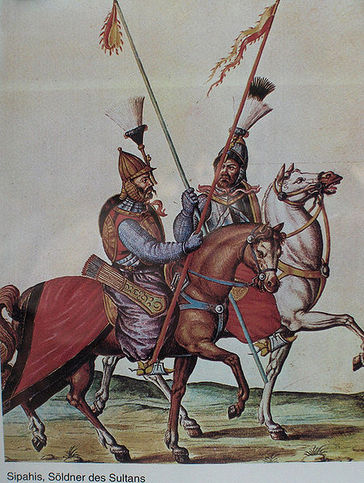 Sipahi at the Battle of Vienna, 1642 As we rode on we passed an ancient Greek church, which seemed pretty poorly built and less richly decorated than the Roman Catholic church, but the most celebrated Madonna in Italy could not be more famous for her miracles than this church!
We stayed that night at Bujuk Cekmege, or Great Bridge; and the next, at Kujuk Cekmege, or Little Bridge. We stayed in a former monastery that now belongs to a hogia or schoolmaster. I asked him to show me his own home, and he pointed to a treehouse he had built for himself and his family at the top of tall cypress! I wanted to take a closer look, but realized I'd probably break my neck on the climb.
Finally, we made it to Constantinople the next day; but I haven't had much time for exploring yet –I've had so many visits to make over the last few days. We are staying in Pera, (which is no more a suburb of Constantinople, than Westminster is a suburb to London). 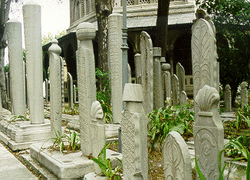 Cemetery on the grounds of the Cemetery on the grounds of the
Süleymaniye mosque A certain French author says, Constantinople is twice the size of Paris. Mr W—— is claims its no bigger than London, though it looks bigger to me, but maybe not quite a populated. The cemeteries themselves are larger than the entire city, I've seen some a few miles long. No graves are ever moved and so land the size of villages becomes devoted to burying the dead. For each grave a pillar is set up and a turban indicating the profession or position of the person is carved into the top. Women have a simple pillar with no carvings or decorations, except those that died unmarried who have a rose at the top of the pillar.
When I wrote earlier about religion, there were a few things I forgot to mention but I wanted to discuss now because they seemed a little unbelievable to me. First, did you know that when a man divorces his wife he can get her back (legally) by simply permitting her to sleep with another man? I know some people who actually choose to do this rather than loose their love entirely. Second, I've learned that a woman who dies unmarried is believed to die in a state of reprobation. As a woman's purpose is to create and multiply, she is only doing what God expects when she is having or taking care of children. Of course, our vulgar misconception that they believe women do not have souls if completely false, though women's souls are seen as inferior to men’s and unable to get into the same paradise reserved for them. There is a “place of happiness” dedicated entirely to the souls of the inferior where all good women may have eternal bliss. Many of the women are superstitious and are afraid to remain a widow for more a week for fear of dying in a useless state. Those that enjoy being free of a husband and are not as strict in their beliefs, just wait and marry when they start to become afraid of dying. This seems very different than the idea that nothing is more acceptable to God than a vow of constant virginity. I'll let you decide which is more traditional...
I can't tell you anything else yet, but once I've done some exploring, you'll hear from me!.
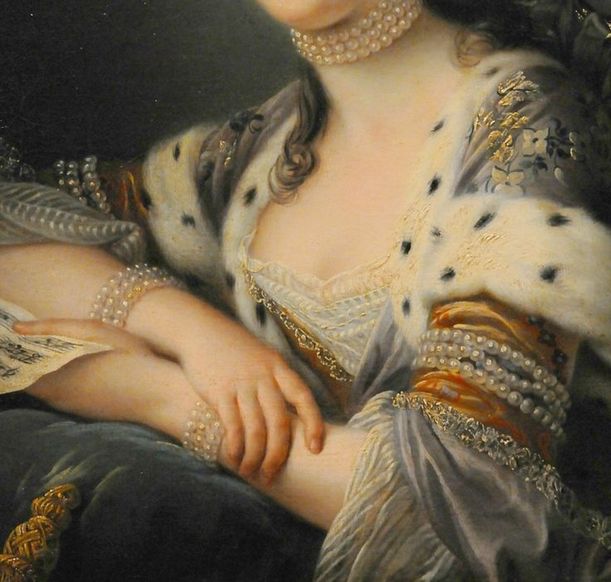 Portrait of a woman in Turkish costume. My head is so filled with everything that happened yesterday that I have to let it out! I was invited to dine with the Grand Vizier’s lady; no Christian has ever been invited for such an event. I decided that I wouldn’t satisfy her curiosity (which I bet was the point of her invitation) if I wore a traditional Turkish dress; so instead, I dressed like the women in the court of Vienna do. I went in a Turkish coach and was attended only by the woman who held my train and the Greek lady who was my interpreter. I was met by a black eunuch who helped me out of the coach and led me through several rooms where the slaves were sitting. They were dressed really nice too.
The lady was sitting on a sofa in a sable vest. She walked over to meet me, and introduced me to a dozen of her friends. She seemed really sweet and looks about fifty years old. I was so surprised to see that there’s really nothing grand in her house. The furniture was pretty modest and aside from the number of slaves she has, nothing about her seemed expensive. She totally knew what I was thinking because she told me that she no longer cares to spend her time or money on materialistic things, and that she's just concerned with charity and praying to God.
She was really hospitable and we talked until dinner was ready. Dinner was served one dish at a time. They use really rich spices in their food and the soup is served last. I felt bad that I couldn’t eat as much as the Lady wanted me to; she was so eager to serve me all kinds of food. At last, they served coffee and perfume, which is basically a sign of respect. The slaves kneeled and sprayed perfume in my hair, clothes, and handkerchief. After this, the Lady made her slaves play instruments and dance. Soon after, we left.
But the night wasn’t over yet. We visited the Kahya’s lady. I’m so glad to have gone there because it was such a difference from the Grand Vizier’s home. Lady Fatima, the Kahya’s lady, was sitting on a sofa covered with pretty Persian carpets and leaning on cushions of white satin. Two young and pretty girls covered in jewels sat at her feet. But they were hardly noticeable in comparison to fair Fatima. I have never seen anything so ridiculously beautiful and no face could ever draw attention like hers. She stood up to say hello and put her hand to hear heart with such sweetness. Although my interpreter told me Lady Fatima is beautiful, I was so amazed by her beauty that I was speechless for a few moments. Oh my God, her features! Her charm! Her perfectly proportional body! Her complexion! Her smile! Her eyes, so large and black and soft! Every angle of her face is beautiful.
After I caught my breath, I tried to find some kind of flaw in her; after examining her for a little bit, I found nothing. Nature had made her more beautiful than what Apelles could have ever painted. The most beautiful English woman would vanish near her.
Lady Fatima was wearing a caftan of gold brocade flowered with silver. The caftan was fitted and accentuated just the right parts. Her arms were decorated with bracelets of diamonds and her belt was set with diamonds too. On her head she wore a pink and silver Turkish handkerchief and her black hair was divided into many tresses. On the side of her head she was wearing a bunch of gorgeous jewels. I think you’re going to assume I am exaggerating her description. I read somewhere that women speak in rapture when they discuss beauty, but I don’t understand why they shouldn’t be allowed to do so. I’m not ashamed to say that I looked at the gorgeous Fatima with such pleasure that the finest sculpture couldn’t have given me.
Her maids sat beneath the sofa and I couldn’t help but imagine a picture of the ancient nymphs. I didn’t think such a beautiful scene ever existed. Lady Fatima ordered them to play and dance. I’m sure that the biggest prude on earth would have looked upon them and thought things I shouldn’t say. When the dance was over, four slaves came into the room and sprayed the air with perfume. Then they served us coffee in the prettiest china. Lady Fatima was so sweet; she called me Uzelle Sultanam, or the beautiful sultana, and felt bad that she couldn’t talk to me in English.
When I left, she gave me a basket of embroidered handkerchiefs. I swear I felt like I was in Mahomet’s paradise. I don’t know how all of this sounds to you but I hope you’re as excited as I am!
I plan on telling you all kinds of new stuff about this place! What will surprise you most is the way I look though…being in my Turkish clothing and all. I’ll attach a photo of myself! The first part of my dress is a pair of drawers that reach to my shoes and conceal my legs more modestly than your petticoats. They are a rosy color, brocaded with silver flowers. My shoes are white and embroidered with gold. Over this hangs my white silk gauze, edged with embroidery. The smock has wide sleeves that hang down my arm and is closed at my neck with a diamond button, but the shape and color of the bosom can be distinguished through it! The antery is a white and gold fitted waistcoat with very long sleeves falling back and fringed with deep gold fringe and have either diamond or pearl buttons. My caftan is also fitted to my body and reaches my feet, with very long sleeves. Over all of this is the belt, about four fingers wide, which is entirely made of diamonds and other gorgeous stones. Now depending on the weather, the curdee is a loose robe they throw on, made of a rich brocade (mine is green and gold) and lined with ermine or sables. The sleeves just barely reach below the shoulders.
The headdress is composed of a cap called talpock, which is made of fine velvet with pearls or diamonds in the winter, and of a light shinning silver stuff in the summer. The talpock is fixed on either side of the head that hangs a little ways down with a tassel that’s bound with a circle of diamonds or a richly embroidered handkerchief. On the other side of the head, the hair is laid flat and depending on individual taste, some ladies put flowers, feathers, or whatever they want; usually though, the ladies wear a large bouquet of jewels made to look like flowers, i.e. pearls, roses of different colored rubies, the jessamines of diamonds, jonquils or topazes, etc. Their hair hangs at its full length behind, divided into many tresses and braided with lots of pearls or ribbons!
It would be so surprising to find a woman who isn’t beautiful around here. They have the prettiest complexions in the world and generally large black eyes. The court of England does not have as many beauties as there are here. Generally, the ladies shape their eyebrows, and wear a lot of eyeliner so that at a distance, it adds very much to the blackness of them. They also paint their nails a rose-color, which I personally don’t like.
Now that I am a little more familiar with the customs in Turkey, I cannot but think of how extremely stupidity of all the writers were that gave accounts of the Turkish women. It’s so clear that these women have more liberty than we do. No woman, regardless of her rank, leaves the house without two muslins, one that covers her face but reveals her eyes, and another that hides her head and hangs half way down her back. They also cover their body shapes with a thing they call ferigee, which no woman appears without. This disguises them so that there is no way you can distinguish a great lady from her slave and no man dares to either touch or follow a woman in the street.
This masquerade allows them to do anything they want without getting discovered. So, you can imagine that not many wives are faithful in a country where they have nothing to fear from their lovers’ indiscretion. They don't have to worry about their husbands either; if they get a divorce, the rich ladies keep all of their money and property, and in addition, the husband is required to pay them. All in all, the Turkish women are the only free people in the Empire.
It’s true that the law allows men to have four wives, but a good man is not going to use that liberty and a woman of rank will definitely not tolerate it. If a man is unfaithful, he will keep his mistress in another house, just like the men in England do. Of all of the great men I know here though, only the Tefterdar keeps a few she-slaves and he has the reputation of a womanizer. Oh, and his wife lives with him but won’t see him ;)
All in all, people are not so different from one another as our travel bloggers would have us think. It would probably be more entertaining to make up some of my own customs but nothing is more pleasant than the truth.
Turkey feels like an entirely new world. I’m not going to bore you all with the details of our tedious journey, but I have to tell you what I saw in Sophia! It’s one of the most beautiful towns in the Turkish Empire and it’s famous for its hot baths. I purposely stopped in Sophia just to see the bathhouses. I hired a Turkish coach to drive me to the bagnio. The coach is entirely covered with scarlet cloth, lined with silk, and richly embroidered. So gorgeous! This covering hides the persons sitting inside, but can be thrown back. Many of the ladies peep through the lattices. When I arrived at the bathhouse at around 10 a.m., it was already filled with women. The bathhouse is built of stone and is in the shape of a dome. There weren’t any windows except for the roof, allowing a lot of light in. After I paid the portress who stands at the door (I noticed the ladies of quality paying her so I made sure to do the same), I entered a large, marble paved, room with four fountains of cold water; the water fell into basins first and then ran on to the floor in little channels which carried streams of water into the next room. There were also marble sofas, but they were so hot with steams of sulfur that you couldn’t possibly stay there with your clothes on.
Although I was not dressed like the women at the bathhouse (I just had one of my dresses on), they treated me with such kindness and civility. I am certain there isn’t a single lady back in England who would have treated a stranger with such politeness. They actually repeated over and over to me “Uzelle, pek uzelle,” which means, “Charming, very charming.”
They sat on sofas covered with cushions and rich carpets and their slaves sat behind them, but you couldn’t tell the difference in their social rank by their clothes because they were all…well, naked. However, there wasn’t anything sexually immodest about them! I cannot describe to you in words how utterly beautiful these women are. They walked and moved with the same grace that John Milton describes of Eve in Paradise Lost. They resembled the perfectly proportionate goddesses drawn by Guido and Titan, their skin is shiningly white, and their beautiful hair is divided into tresses and braided with either pearl or ribbon. I swear if it were the fashion to go naked, their faces wouldn’t be noticed. I greatly admired their fine skin and perfect body shapes. I secretly wished that Mr. Gervase [1] had the ability to go invisible and observe these ladies in their different postures, some lying on their cushions, others conversing, braiding hair, working, or drinking coffee…I think it would improve his art ;)
One of the women insisted I sit by her and undress for the bath. The ladies were adamant in persuading me to undress, but I had to refuse. In the end, I was forced to open my dress and show them my corset, which satisfied them. They couldn’t believe I was so locked up in that machine and they attributed my wearing it to my husband.
I wanted to spend more time with the women but Mr. W wanted to continue our journey to Constantinople early the next day, so I left before I really wanted. Anyway, I’m sure I entertained you with a sight you’ve never seen in your life and no male, travel book can inform you of! It is like death for a man to be caught in one of these places.
Welcome to my first post! I'm Lady Mary Wortley Montagu and I'm so excited to share my travels with all of you! Thank you for all of your emails and tweets! I'm in Belgrade now, about to set out to Adrianople and finally really begin my travels through Turkey!
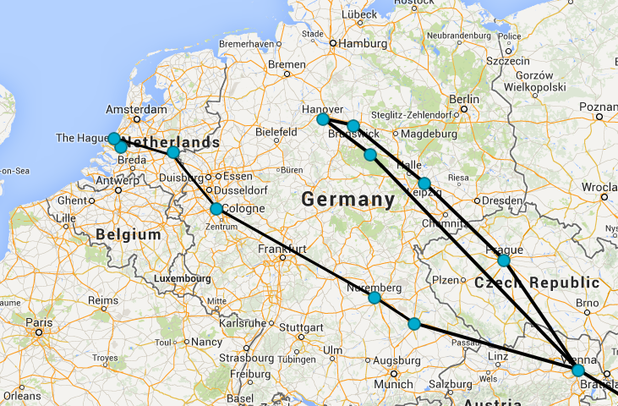 The first half of my trip around Europe! We stayed about 6 months before we headed on to Turkey! We first arrived in Rotterdam (see pics on twitter, @Lady_Mary_WM) and then traveled to The Hague, Cologn, and Nuremburg on our way to Vienna. The culture in Vienna is wonderful! I hate to say it, but I've strayed so far from the discipline of the church as to see an opera, Angelica's Victory Over Alcina by Johann Josef Fux, at the Garden of The Favorita and I LOVED it (don't judge me, Mr. Pope)! It was so dynamic and there were so many scene changes! Check out this short recording I did at the show!
In Vienna, I had a private audience with the Empress, (Elisabeth Christine of Brunswick-Wolfenbüttel) and spent time with the ladies at court. I have to tell you about the beauty of the Empress! Forgive my poetics, but even the all the words the poets have said of Juno and Venus could not measure up to her. She has the most amazing smile, fine hair, and perfect grace: even The Venus de' Medici was not more perfectly formed. Anyway, while I was visiting, I saw many ladies of the court and I have to say that fashion in Vienna is much different than England and France and much less practical. Women's hairstyles are a bit odd too. They build up their hair so high on their heads using piles of gauze and ribbon and cover it in powder and jewels to hide it. It seems far outside the realm of common sense, but even the Empress, as lovely as she is, must comply!
The only thing that's similar to our fashion in England is the petticoat, and that has ours outnumbered by a few yards . Sometimes the women just wear a scarf with anything they like underneath. Whenever the ladies feel like getting dressed up, they declare it Days of Gala and everyone comes over in their best outfits. They wear clothes embroidered in rich gold--but they don't seem to show much taste to them provided they are expensive! 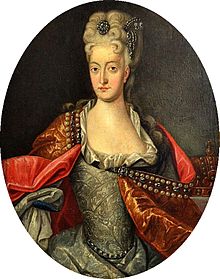 Portrait of Elisabeth Christine of Brunswick-Wolfenbüttel by Johann Gottfried Auerbach (1697–1753) One thing I do love about Vienna is the way the "older" women are treated. Here, a women of 35 is considered a young girl and is treated as young a beautiful! What a relief this would be to many young women in England who are already considered old maids; if only they had been born here instead! In Vienna, I was also encouraged to take a lover, though none of the women are coquettes or prudes. Here it seems that women are respected more based on the rank of their lovers than their husbands. It is quite common knowledge, even an expectation, that a women will take a lover; the ladies here couldn't understand why I would disgrace myself by not having a little intrigue. The women even control their lovers' estate and fortune. A young count even asked me to engage in a little affair of the heart! Obviously I said no, and had this happened in England, I would have been more offended but I spent enough time in Vienna to know that he was simply doing what he was obligated to do. "Gallantry and good breeding are as different in different climates as morality and religion" (66).
Marriage laws in Vienna are quite different from England, not that I know much about these things. Here it seems that dowries are limited to about 2,000 florins (about 200) and whatever money a woman possesses outside of the dowry is hers; her husband can't seize it or control what she does with it. As a result, many women end up wealthier than their husbands! But unfortunately, widows have no place in Vienna as they lose their rank when their husbands die.
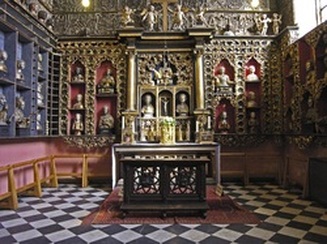 Basilica of St. Ursula's I know that you all expect to hear about the churches and convents. In Cologne, we toured the Basilica of St. Usrula's and it was beautifully decorated with rich images of saints, relics, and tons of pearls, diamonds, and rubies. I have to admit, I even found myself looking quite longingly at St. Ursula's pearl necklace…
In Vienna, I visited the convents, and St. Lawerence's was easily my favorite because of its ease and neatness. It seems much easier to live with than the nastiness and perpetual state of penance at the other convents. I couldn't help but laugh when they showed me a wooden head of our Savior that they swore spoke during the siege of Vienna (they said the open mouth was proof!). Here's a short video of the Chamber of the Bones in St. Ursula's, alleged to contain
the bones of martyred Princess and the 11,000 virgins who were massacred by the Huns (51). After all of this time in Vienna, we spent some time in Prague and Hanover, stopping at Leipzig and Brunswick in between. On the road to Leipzig I swear we almost died, the roads were so dangerous along the River Elbe. Mr. W slept through it all and I, being a good wife, didn't wake him. We barely stopped in Dresden, though I wish we could have stayed longer. The Saxon ladies as so affected, they would think it a mortal sin if they spoke or moved in a natural way.
In Hanover, the women are absolutely beautiful with rosy cheeks, snowy complexions, and coal black hair. The opera house too is much finer than the one in Vienna. We saw the Herrenhausen Gardens which were covered in snow, but still beautiful! There were so many orange trees! A brief video of the gardens We traveled back to Vienna and attended a carnival. Because of the war with the Turks, we weren't allowed to wear the typical carnival masks. We eventually left Vienna and arrived in Gyor, Hungary. For a long time, Gyor was the frontier between the Turkish and German empires. The Turks tried to conquer it many times, sometime successfully, but in the end, the Germans regained control. We continued our travels through beautiful and fruitful plains between Nosmuhl and Buda, but most of the region remains like a desert because of the long war with the Turks and the Emperor. Even worse were the towns of Adam and Fodowar, which are largely forest-like; this part of the country was better off when the Turks ruled. Because it's so little frequented, it was surprising to see the vast number of wild fowl, "which often live here to a good old age and undisturbed by Guns in quiet Sleep."
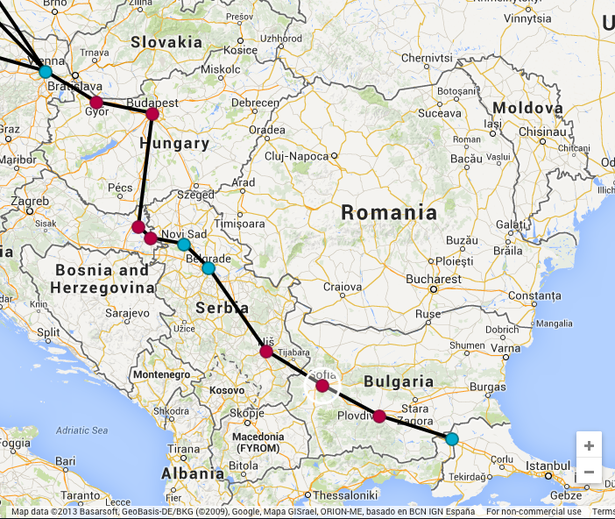 The second half of my journey to Turkey! We took our time and traveled cross-country from Vienna to Belgrade, and soon I'll be in Adrianople! We then passed through Mohatch, Danube, Esseek, and finally Bocowar where we waited until everything was clear concerning our crossing into the Turkish frontier. We were promised by General Bassa Seraskier to be well received in Turkey! We were told that we would be escorted by a Turkish convoy in Betsko, a village between Peterwaradin and Belgrade. When we finally arrived in Betsko, we were met by Turkish soldiers and then made our way to Belgrade. Belgrade is a strong city conquered by the Grand Vizier and strengthened by the numerous garrisons of the bravest soldiers who are commanded by the Bassa. Franky, I did not feel very comfortable here. We were expecting to leave in one night but the Bassa had detained us until he received orders from Adrianople.
Fortunately, we stayed in one of the best houses here and I made friends with our host, Achmet-Beg, whose father was a great Bassa. He dined with us every night and drank wine freely. He was so happy with the liberty of conversing with me; he explained to me some pieces of Arabian poetry, which are generally written in alternate verse, and are rather musical. Their expressions of love were so passionate and lively, and I noticed they were not so different from our own English poetry! I impressed Achmet-Beg by retelling some of the Persian tales that I know. He has such wit and is much more polite than many of our own Christian men back home.
However, these amusements did not hinder me from wanting to leave this place. I'll be leaving Belgrade for Turkey tomorrow. Make sure to follow me here on the blog and my on Twitter @Lady_Mary_WM to stay updated on my adventures in Turkey! *This post references letter 1-25 of The Turkish Embassy Letters, see the full-text here*
|



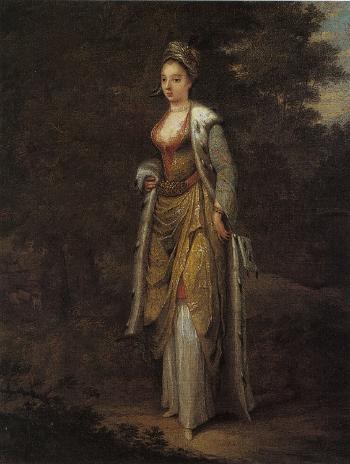




 RSS Feed
RSS Feed